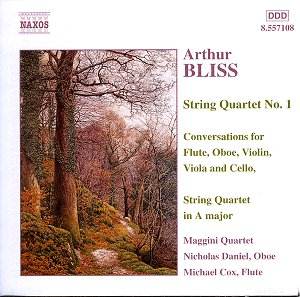Arthur Bliss is not normally a name associated with
the "folksong" movement of the early twentieth century but the earliest
piece recorded here (the A major quartet) certainly represents a great
deal more than mere flirtation with that genre. This, perhaps, is one
explanation for its later suppression, for it is certainly not inferior,
in musical terms, to the other items. In fact, as far as this listener
is concerned, it represents the finest twenty minutes on the disc. Even
a superficial hearing would reveal a kinship with Vaughan Williams,
Howells (especially the Phantasy Quartet), Moeran and, underlying
it all, as with so much of Bliss's early music, the inspirational figure
of Maurice Ravel. Even by the third minute of the first movement, marked
Moderato ma tranquillo, there are echoes of the French master
in the use of pizzicato string sonorities although the actual tune is
pure English "folk" in its suggestion (if not derivation). The beautiful
slow movement then travels across the Irish Sea to recall O'Carolan's
haunting Farewell to Music although it also has an almost Elizabethan
feel at times. The closing Allegro is also primarily wistful
in tone and the quartet as a whole fully justify the Maggini's decision
to revive it, a coup almost as significant as their revival of another
superb but neglected quartet on their unmissable Moeran disc. For me,
this music is up there with his greatest chamber works, i.e. the clarinet
and oboe quintets.
I have to confess a strong preference for early rather
than late Bliss, although there are exceptions. The aforementioned French/Ravel
influence that pervades much of it is probably a key factor and the
second piece on the disc, Conversations, certainly makes the
connection overt. It is described as a "homage to Les Six" and
I can definitely detect Milhaud in there. The unusual quintet line-up,
in which the Maggini are supplemented by Nicholas Daniel (oboe and cor
anglais) and Michael Cox (flutes), makes for some interesting listening.
Three fairly light and upbeat movements are interleaved with two slower,
more deeply felt sections. The first of these, In the Wood, has
some gorgeously evocative playing in the high strings, whereas the second,
Soliloquy, is a meditation for cor anglais alone. If, as a whole,
Conversations, is rather uneven and pulling in opposite directions
at times, it has some truly sublime moments.
By the time Bliss wrote his first "official" string
quartet (the B flat major), in the States, during the Second World War,
it appears that his model had shifted from French/folksong to the received
tradition of Elgar/Walton etc (with the odd dissonance thrown in). While
it is expertly crafted and contains some lovely passages it also shares,
with many of his later pieces (e.g. the cello concerto), a tendency
to sprawl. It runs to nearly half an hour in its four movements and
will, I feel, be the piece on the disc I will be returning to least
often.
So, in conclusion, I would say that for anyone collecting
the Maggini/Naxos series this is well up to the normal very high standards
in terms of musical content, recording and, especially, performance
but does not quite compare with the magnificent Moeran and Bax issues.
It is nevertheless highly recommended and the music it contains is certainly
not insignificant.
Neil Horner


